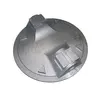Mobile:+86-311-808-126-83
Email:info@ydcastings.com
Understanding the Functionality of Closed Impellers in Pump Design
The Importance of Impeller Design in Closed-Circuit Systems
In the realm of fluid dynamics and mechanical engineering, the role of the impeller is pivotal, especially in closed-circuit systems. The impeller is a rotating component designed to convert kinetic energy into fluid flow, and its design significantly impacts the efficiency and effectiveness of various applications, including pumps, compressors, and turbines. This article dives into the importance of impeller design in closed systems and how it influences performance.
Closed-circuit systems are characterized by a continuous loop of fluid circulation, often used in cooling, heating, and process applications. In such systems, maintaining optimal fluid flow and pressure is crucial for operational efficiency. The impeller, as the driving force behind the fluid movement, plays a vital role in achieving these objectives.
The Importance of Impeller Design in Closed-Circuit Systems
Moreover, the materials used in the construction of an impeller influence its performance and longevity. In closed systems, impellers are often exposed to various chemicals and temperatures. Therefore, selecting materials that resist corrosion and can withstand thermal stresses is essential. Advanced materials, such as stainless steel and polymer composites, are commonly employed to enhance durability and improve overall system reliability.
impeller closed

Another significant aspect of impeller design is the balancing of forces. In closed circuits, the fluid dynamics can lead to varying pressure levels and flow rates, creating potential imbalances. An unbalanced impeller can cause vibrations, leading to mechanical wear and failure. Hence, careful consideration of the impeller's weight distribution and rotational symmetry is crucial. Engineers often use computational fluid dynamics (CFD) simulations to analyze and optimize these parameters before finalizing the design.
Efficiency is not just about the impeller itself; it's also about how well it functions within the entire system. An effective impeller design considers the interaction with other components, such as volutes or diffusers. These components guide the fluid upon exiting the impeller and play a crucial role in converting kinetic energy into pressure energy. A harmonious integration of the impeller design with these system aspects can significantly enhance overall performance.
In closed-circuit applications, energy efficiency is of utmost importance. High-efficiency impellers can lead to reduced operational costs, lower energy consumption, and decreased environmental impact. This aligns with the growing emphasis on sustainability across various industries. Engineers are continually innovating impeller designs that not only meet performance needs but also adhere to stringent energy regulations.
In conclusion, the impeller's design is fundamental to the efficiency and reliability of closed-circuit systems. By understanding the intricacies of fluid dynamics, material selection, balance, and system integration, engineers can create impellers that optimize performance and drive innovations in various applications. As industries continue to evolve, the ongoing advancements in impeller technology will undoubtedly play a significant role in enhancing the efficiency and sustainability of closed-circuit systems.
-
Why Should You Invest in Superior Pump Castings for Your Equipment?NewsJun.09,2025
-
Unlock Performance Potential with Stainless Impellers and Aluminum End CapsNewsJun.09,2025
-
Revolutionize Your Machinery with Superior Cast Iron and Aluminum ComponentsNewsJun.09,2025
-
Revolutionize Fluid Dynamics with Premium Pump ComponentsNewsJun.09,2025
-
Optimizing Industrial Systems with Essential Valve ComponentsNewsJun.09,2025
-
Elevate Grid Efficiency with High-Precision Power CastingsNewsJun.09,2025











